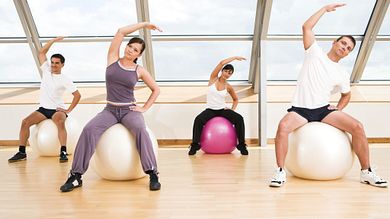
Social activities for residents of nursing homes vary from one place to the next. There are many factors that contribute to this variation, including the structure of the nursing home and its culture. In some homes, residents have little choice when it comes to activities, while in others they have access to a wide variety of options.
Social participation of residents is affected by staffing levels. A study by den Ouden, et al. showed that approximately half of the residents' activities were managed by nurses. This could be explained by the fact that many activities occurred during shift changes.
Activities were chosen according to the residents' interest and their daily routine. Researchers observed both unstructured and structured activities. These activities included music, dance, games, and card games. Card games promote social interaction by encouraging relationships that are based on common interests.

Among the most popular activities were concerts, bowling, and church services. Female residents were more interested in crafts and dancing than singing, and bingo was a favorite pastime of male residents. Residents had another chance to get involved in social activities during mealtimes. The library and the theater were also available.
The study's findings suggest that nursing home staff need to focus on providing support and autonomy to residents in order to improve their quality of life. Good connections to the outside world, as well as adequate supervision can facilitate meaningful social participation.
The multidisciplinary study, which was conducted in long-term care facilities in Norway and Canada, explored practices and perceptions of staff members. It involved ethnography as well as observation and interviews. Local researchers as well as international team members conducted observations. Interview topic guides for family, staff, managers and volunteers were also created. Observations are key to understanding residents' daily lives, and their needs.
One resident at a British nursing house described the difficulties she encountered in accessing the offered activities. She was unable to locate the appropriate room for her participation, and this led to frustration. She would like to be more involved in the selections. Others shared their desire for more variety and activities.

The study's authors found that the nursing staff's roles in taking over the activities and providing support were rarely observed. However, the study did find a few cases in which residents were assisted by nursing staff. This led to less supervision than was previously thought. The nursing staff needs to ensure residents have the opportunity to express their interests and talents in their daily lives in order to encourage meaningful social interaction.
Residents' needs and abilities must be considered by staff at nursing homes. This is particularly true for secure units where residents might need to request simple things. It is also important to think about the facility's layout and staffing levels in order for residents to be as independent as possible.
To ensure the accuracy of the data collected, the authors of this article met and discussed the study's results. They gathered all the data required and checked that the information in the study was accurate.
FAQ
What is the difference among a virus or bacterium and what are their differences?
A virus is a microscopic organism which cannot reproduce outside of its host cell. A bacterium (or single-celled organism) reproduces by splitting itself into two. Viruses measure only 20 nanometers in diameter, but bacteria is up to 1 millimeter in size.
Viruses are usually spread through contact with infected bodily fluids, including saliva, urine, semen, vaginal secretions, pus, and feces. Bacteria are often spread via direct contact with contaminated surfaces and objects.
Viral infections may enter the body through cuts, scrapes. bites and other skin breaks. They can also get into the skin through the nose, mouth and eyes, ears as well as through the rectum, rectum and anus.
Bacteria may enter our bodies through cuts and scrapes on our skin, burns, insect bites, and other wounds. They may also be introduced into our bodies through food and water as well as soil, dirt, dust, and animals.
Both bacteria and viruses can cause illness. But viruses do not have the ability to multiply within their hosts. Infecting living cells is what causes them to become sick.
Bacteria can multiply within their hosts and cause illness. They can invade other areas of the body. That's why we need antibiotics to kill them.
What is the ideal weight for my height? BMI calculator & chart
Use a BMI calculator to determine how much weight is needed to lose. Healthy BMI ranges between 18.5 to 24.9. You should lose about 10 pounds each month if you are trying to lose weight. Simply enter your height/weight into the BMI calculator.
To see if you're overweight or obese, check out this BMI chart.
Improve immunity with herbs and supplements?
Natural remedies and herbs can be used to increase immune function. There are many natural remedies that can boost immunity, including echinacea (oregano), ginger, ginkgo biloba and vitamin C.
These herbs should not be considered as a substitute for conventional medical treatment. These herbal remedies can cause nausea, diarrhea and stomach cramps. They can also cause dizziness, headaches, dizziness, allergic reactions, and stomach pains.
What is the difference of fat and sugar?
Fat is an energy source from food. Sugar is a sweetener found in fruits, vegetables, and other foods. Both fats (and sugars) have the exact same calories. However, fats contain more than twice as many calories as sugars.
Fats are stored within the body and can contribute to obesity. They can cause cholesterol buildup which can lead to strokes and heart attacks.
Sugars are quickly absorbed and provide instant energy. This causes blood glucose levels to rise. High blood glucose levels can lead to type II diabetes.
What is the most healthful lifestyle?
You can live a healthier lifestyle if you eat healthy food and exercise regularly. These guidelines will help you live a long, healthy life.
Start small by changing your diet and exercising routine. You can lose weight by walking 30 minutes each day if you are looking to lose weight. For more activity, you can try swimming or dancing. You could also join an online fitness program like Fitbit or Strava that tracks your activity levels.
Why should we live a healthy existence?
Healthy living can lead to a longer and happier life. Healthy eating habits, regular exercise, healthy sleep habits, stress management, and good sleep habits can help to prevent heart disease, stroke, diabetes, cancer, and other serious diseases.
By living a healthy lifestyle, we can improve our mental health. It will make us more resilient to everyday stress. Having a healthy lifestyle will also boost our self confidence and help us look and feel younger.
Statistics
- According to the 2020 Dietary Guidelines for Americans, a balanced diet high in fruits and vegetables, lean protein, low-fat dairy and whole grains is needed for optimal energy. (mayoclinichealthsystem.org)
- According to the Physical Activity Guidelines for Americans, we should strive for at least 150 minutes of moderate intensity activity each week (54Trusted Source Smoking, harmful use of drugs, and alcohol abuse can all seriously negatively affect your health. (healthline.com)
- WHO recommends consuming less than 5% of total energy intake for additional health benefits. (who.int)
- This article received 11 testimonials and 86% of readers who voted found it helpful, earning it our reader-approved status. (wikihow.com)
External Links
How To
10 tips to a healthy lifestyle
How to maintain a healthy lifestyle
We live in a fast paced world, where we don’t get enough sleep and smoke cigarettes. We don’t care enough about our health.
It is very hard to find a balanced diet and exercise routine when you work fulltime and do all these things at the same time. It becomes even harder if you are stressed out because your mind tells us that we cannot handle this situation anymore so we start feeling guilty and give up.
You may feel that something is not right with your body. Consult a doctor immediately to get his/her opinion on your current condition. If nothing is abnormal, it might be stress due to your job.
People believe they are lucky because they can go to the gym every day or have friends who keep them fit. Those people are lucky. Those people don't have any problems. They control everything. I wish that everyone could be like them. Unfortunately, many of us don’t know how to manage our personal and work lives. Many people fall prey to bad habits, which can eventually lead them to developing diseases like heart disease, diabetes and cancer.
These tips can help you improve your lifestyle.
-
Get enough sleep, minimum 7 hours, maximum 8 hours. This includes proper sleeping postures and avoiding caffeine in the hours before bed. Caffeine blocks melatonin, which can make it difficult for you to fall asleep. Also, make sure that your bedroom is clean and dark. You should use blackout curtains if possible, especially if your work is late at night.
-
Get healthy - Start your day with a good breakfast. Try to avoid sugar products, fried foods, processed food and white breads. Fruits, vegetables, whole grains and whole grains are good options for lunch. Afternoon snacks are recommended to be rich in protein and fiber, such as nuts, seeds, beans, fish and dairy products. Avoid junk food like chips, candy bars, cakes, sodas, and cookies.
-
Drink lots of water. We don't have enough. Water helps us burn more calories and maintains our skin's youthfulness. It also flushes toxins out of our bodies and improves our digestion. Aim to drink six glasses of fluids daily to lose weight more quickly. You can check the color in your urine to see how well you are hydrating. A yellow urine color indicates that you are dehydrated. An orange urine color means that you are slightly dehydrated. Pink urine means that your hydration level is normal. Red urine means that you are overhydrated. Clear urine means that your urine is highly-hydrated.
-
Exercise - Regular exercise has been shown to reduce depression and increase energy levels. Walking is an easy workout that can also improve your mood. Walking may appear easy but requires concentration and effort. Your brain must focus on walking and breathe slowly and deeply. For between 100 and 150 calories, a 30 minute walk can be enough to burn about 100 to 150 calories. Start slow and work your way up. Stretching is key to preventing injuries.
-
Positive thinking is crucial for mental health. When we think positively, we create a happy environment inside ourselves. Negative thoughts drain energy and can cause anxiety. You can stay motivated by thinking about what you want to accomplish. Reduce the number of tasks you have to do in order to feel less overwhelmed. Do not be discouraged if you fail, just get up and try again.
-
Say No. We can often be so busy that it is hard to see how much of our time we are wasting on useless tasks. It is important for you to know when to say no. However, saying no does not necessarily mean you are rude. Saying No is simply saying that you cannot take care of something right now. You can always find other ways to complete the job later. Try to set boundaries. You might ask for the help of someone else. This work can be delegated to someone else.
-
Take care to your body. You can boost your metabolism by eating healthier foods. Avoid eating anything heavy or oily as they can raise cholesterol levels. Good advice is to have at least three meals and two snacks per day. Around 2000 to 2500 calories should be consumed each day.
-
Meditation can be used to reduce stress and anxiety. You can relax your mind by simply sitting still and closing your eyes. This exercise will allow you to have clarity of thought which can be very useful in making decisions. Regular meditation practice will help you be calmer, happier, and more peaceful.
-
Breakfast is the most important meal for the day. Skipping breakfast can lead you to overeating at lunch. You don't have to wait until noon to enjoy a healthy breakfast. Eaten breakfast will boost your energy and help you manage your hunger.
-
Good food is healthy. Avoid junk food and other food items that have artificial or preservative ingredients. These foods make your body feel acidic, and can cause you to crave them. Fruits and vegetables are rich in vitamins and minerals that improve overall health.
-
***